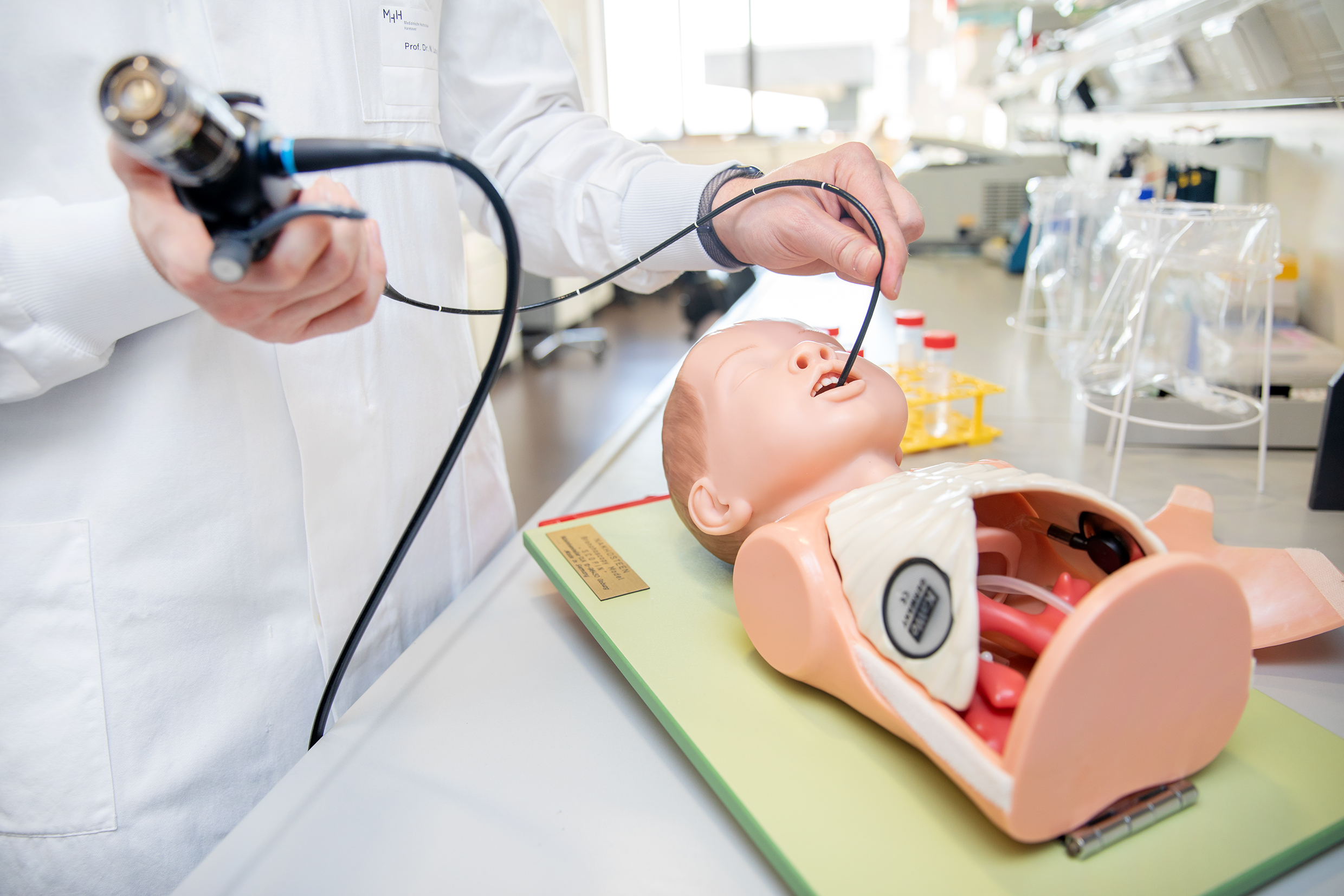MHH professor receives "ERC Proof of Concept Grant" from the EU for the further development of a novel immune cell therapy

Project "iMAClung": Is bronchoscopy suitable for bringing healthy macrophages into the lungs? Copyright: Karin Kaiser/MHH
Treating bacterial pneumonia with healthy macrophages – that is the goal of the team led by Professor Dr. Nico Lachmann, Department of Pediatric Pneumology, Allergology and Neonatology at Hannover Medical School (MHH) and the Cluster of Excellence RESIST. The European Union (EU) has now awarded his "iMAClung" project, with which he is taking the next steps towards the application of immune cell therapy, an "ERC Proof-of-Concept Grant".
Until now, bacterial pneumonia has mainly been treated with antibiotics that affect the entire body. In addition, there are pathogens that are resistant and can therefore only be treated to a limited extent. In order to break new ground, macrophages, which Professor Lachmann works with, are to be injected directly into the lungs and have a therapeutic effect there. Macrophages are also normally present in the lungs and belong to the white blood cells; as part of the immune system, they eliminate pathogens. If this does not work or does not work sufficiently, severe infections are the result, which can even be fatal. This is where therapy with healthy macrophages, which Professor Lachmann's team produces in the laboratory from so-called induced pluripotent stem cells (iPS cells), should help.
Therapy on the spot
Unlike antibiotics or other treatment methods, the macrophages are to be delivered directly to the site of the infection in order to be effective. The "iMAClung" project, which is now being funded by the EU, focuses on whether bronchoscopy – a method in which a probe is inserted into the windpipe via the throat – is suitable for delivering the healthy macrophages to the lungs. Do the cells stay where they are supposed to? Do they trigger undesirable reactions and if so, which ones? These questions need to be clarified. In order to answer such questions of safety and feasibility, the team uses special lung tissue that is not suitable for transplantation. As part of an interdisciplinary team from various departments at the MHH, the researchers are using the Organ Care System (OCS) from the MHH Department of Cardiothoracic, Transplantation and vascular Surgery (HTTG) – a mobile device in which lung tissue is transported at body temperature, perfused with blood and supplied with oxygen and nutrients. With this procedure, the feasibility of this new immunotherapy can now be tested close to humans for the first time.
The macrophages produced using iPS technology allow the latest insights into infection medicine, which are also used by other research groups. These include teams from the Cluster of Excellence RESIST, which are investigating viral infections – for example those of Professor Dr. Abel Viejo-Borbolla, Professor Dr. Thomas Werfel, Professor Dr. Ulrich Kalinke and Professor Dr. Dorothee Viemann.
Successful with macrophages
An "ERC Proof of Concept Grant" is intended to explore the commercial or social innovation potential of an ERC research project. Only researchers who have already received an ERC award are eligible for the grant. Professor Lachmann received the prestigious ERC Starting Grant from the EU at the turn of the year 2019/2020, providing him with funding of 1.5 million euros over five years for his project "iPSC2Therapy" on human macrophages. The project is investigating how human macrophages develop and can be used therapeutically. In 2022, Prof. Lachmann has already received an ERC Proof of Concept Grant – in which he wants to use macrophages to detect possible impurities in drugs by developing the iPyro method.
RESIST – Research to help the most vulnerable
Professor Lachmann holds his professorship at the MHH as part of the Cluster of Excellence RESIST (Resolving Infection Susceptibility) led by the MHH. RESIST consists of around 50 teams that aim to better protect particularly susceptible people from infections. These include physicians working in hospitals, who are very familiar with the situation of patients, as well as basic scientists who research pathogens and their interaction with the immune system down to the smallest detail. RESIST consists of six partner institutions. The spokesperson is Professor Dr. Thomas Schulz, Head of the MHH Institute of Virology. The German Research Foundation (DFG) is funding RESIST. Further information can be found on the homepage www.RESIST-cluster.de.
Text: Bettina Bandel